On your volunteering trip to Ghana, you will see lots of young women selling items on the street. This young lady sold us spices in the town of Tamale in northern Ghana.
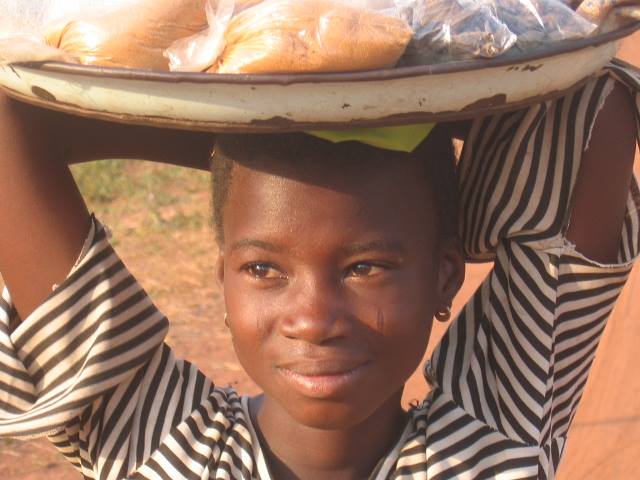

On your volunteering trip to Ghana, you will see lots of young women selling items on the street. This young lady sold us spices in the town of Tamale in northern Ghana.
Bryan from Oregon spent part of his summer as a volunteer basketball coach and organizer in Ghana.

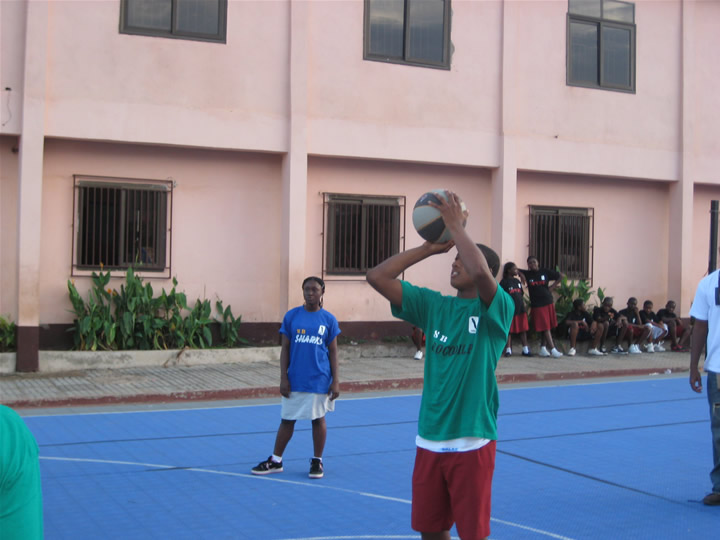
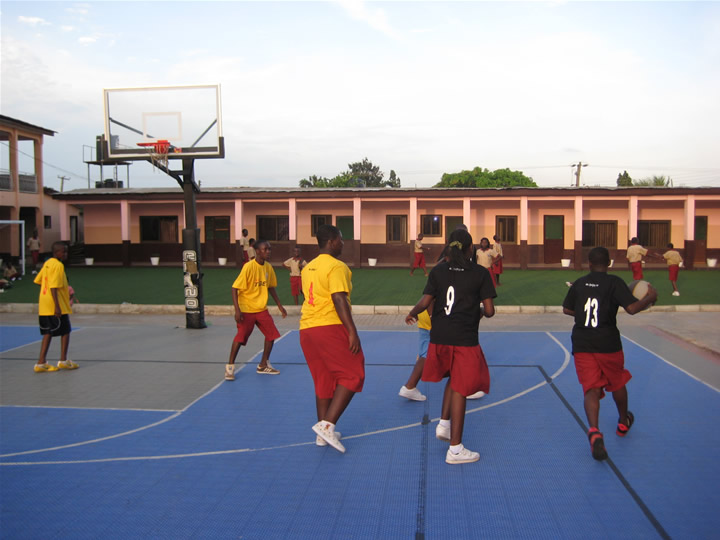

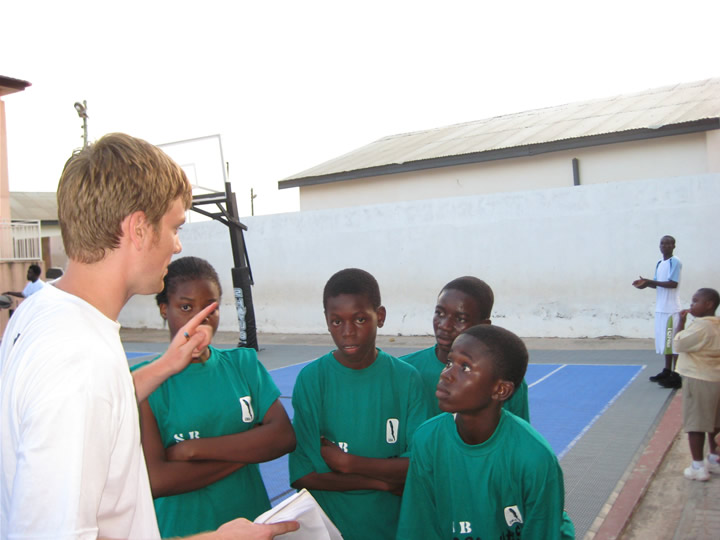
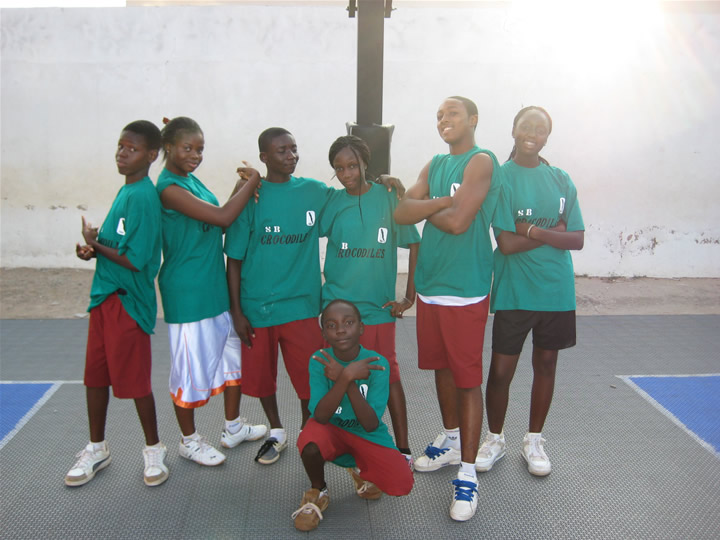
We have the dates for our High School Service Learning Trip to Ghana next summer!
The dates: June 30 – July 13, 2013.
You will be involved with three main activities — volunteering at an orphanage; lectures on African culture; and field trips to cultural sites.
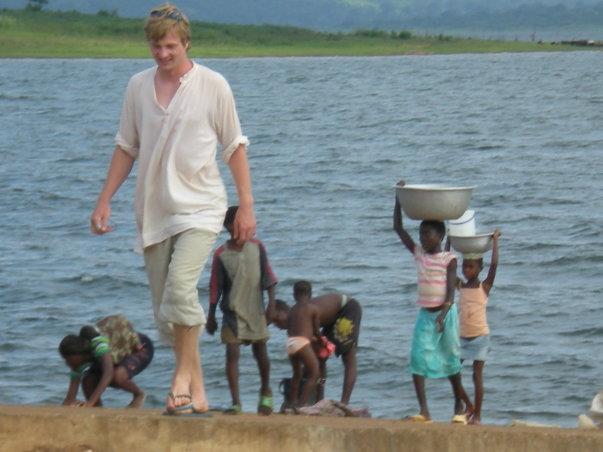
Should you bring a laptop to Ghana? It depends.
It’s a good idea to bring a laptop to use it as a storage and backup device for your photos, or to keep a trip journal.
However, if you are looking to connect to the Internet with your laptop, you will probably experience mostly frustration.
First, public wireless connections in Ghana are few and far between. On one of my trips to Ghana, I was using my laptop at a hotel in Cape Coast hotel when I picked up a free wireless connection from a local Internet cafe. I considered it a small miracle, but it wasn’t very smart on my part because someone could have easily hacked into my laptop.
The good news is that You can bring a laptop and buy a wireless card from one of the telcom providers in Ghana for approximately $100+ USD. However it is dial-up-speed at-best, with intermittent service much of the time.
Most Internet cafes will not allow you to plug your laptop into their Internet connection. Even if one does, I would recommend against it, again because of security concerns. Although it might sound paranoid, there is a possibility of someone gaining access to your laptop’s data and/or stealing your passwords as you type them.
If you really want to upload photos to the Internet during your trip, perhaps try to copy them from your laptop to a flash drive (bring one from home), then see if the Internet cafe will let you copy them from the flash drive to one of their computers.
Do not keep any sensitive information on your laptop in case of theft, such as your bank account information, passwords, etc.
Ghana is a very dusty place, so bring a plastic cover for your laptop, and pack away the laptop when you’re not using it.
When traveling around Ghana, pack the laptop in a backpack that you keep with you at all times (rather than packing it in a larger suitcase that will be stored in a compartment away from you on a bus). Try not to take it out of the bag when you’re outdoors, so as not to attract attention from any would-be robbers.
For the battery/charger, mine actually got fried on my last trip to Ghana, because I didn’t use a surge protector (I plugged it directly into the outlet). So, when you arrive in Accra, ask our Coordinator to help you buy a surge protector. It costs $5-$10 and is well worth it.
Lauren Grimanis, a former Cosmic Volunteer, started her own charity to help people in Ghana. It’s called The Akaa Project and their latest efforts include raising over $4,000 for the expansion of the Asiafo Amanfro Community School in Eastern Ghana. Way to go, Lauren!
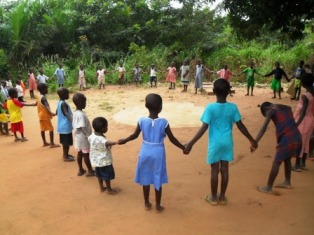

Our volunteers Teresa and Andrew Allen have written a book about their experiences volunteering at an orphanage in Cape Coast, Ghana in in 2009.
The couple volunteered at the Children Of Hope Orphanage in Asebu, Ghana.
Here are some text excerpts from their book:
You are invited to Asebu, Ghana, and the humble home of 17 happy, smiley, and bouncy Children of Hope.
Running to meet us is little Olivia. Her welcome gifts to us are her smile, laughter, kindness, and love of learning.
The Children of Hope are proud to introduce us to their goats. These lucky goats couldn’t have better caretakers — or friends — than the Children of Hope.
Twice a day, the Children of Hope collect fresh water for meals and baths. Their home does not have electricity or running water, so the children walk a mile to and from the water source, carrying buckets on their heads.
Two kind women care for the Children of Hope, day and night. And on Sundays, they
spend many hours making the children’s favorite food: fu fu! Fu fu is a traditional Ghanaian dish made from pounded cassava root and is served with a savory stew.
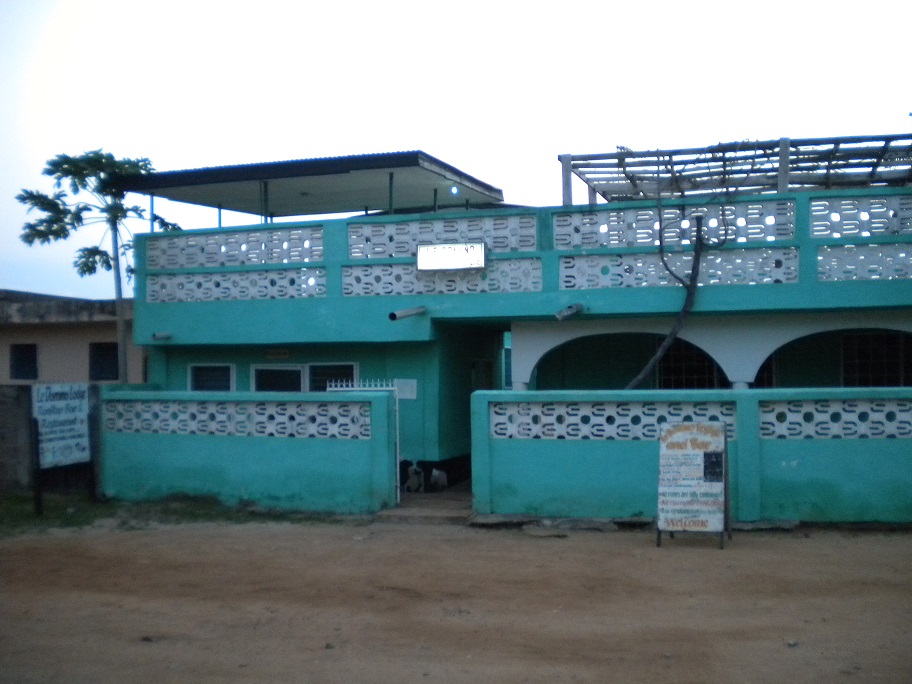
As USA Today wrote yesterday, hotel websites are notorious for having photos and descriptions that don’t match reality.
I’ve heard this a lot from volunteers over the years traveling to Vietnam, Ghana, India etc:
> In Delhi last month, I walked by one of the hotels I browsed online before leaving home. The hotel’s website photos were so misleading – the building was run-down in person and was located right next to a large trash-dump.
> I once talked to a hotel owner in Ghana whose website had photos of a resort hotel, while the reality was that his hotel was basically a run-down brothel in a dumpy neighborhood in Accra.
> In Vietnam last year, one of our volunteers booked a beautiful-looking hotel in Saigon for several weeks, only to find on arrival that it was a small hotel located down a cramped and noisy alley.
My advice:
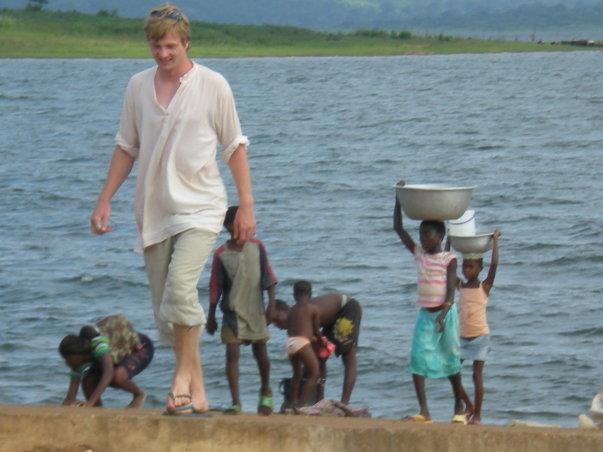
The BBC has a story today on the lack of clean water in Ghana.
A large part of the population in Ghana still doesn’t have access to clean water. Some of the poorest Ghanaians pay a quarter of their income on purchasing it from private sellers.
If you have spent any time in Ghana, you have undoubtedly seen locals carrying containers of water, even in the capital city Accra.
The BBC talks about Maamobi, 23-year-old Abiba and her sister, Wasila, who is only six. They walk three miles every morning to fetch a gallon and a half of water.
Ten years ago, when the idea of privatising Ghana’s water system was first proposed by the World Bank, local activists were alarmed. Fearing a profit-seeking company would raise the cost of water for ordinary Ghanaians, they formed the Campaign Against Water Privatisation.For five years a fierce public debate raged.
Then the World Bank and Ghana’s government adopted a compromise.
A private company, Aqua Vitens Rand Limited (AVRL), was given a contract to manage the existing system, while the responsibility for improving and expanding the infrastructure remained with the government.
Still, Alhassan Adam, from the Campaign Against Water Privatisation, says since then the situation has only got worse.”If you talk to any water consumer they will tell you the water crisis is getting worse and worse, especially in the big cities where Aqua Vitens Rand are managing the water system,” he says.”We are seeing the water system collapsing at a faster rate than when it was under public management.”
The population of Ghana’s cities is growing rapidly as people move from rural to urban areas in search of a living.
The World Bank estimates half a billion dollars would be needed to resolve water supply problems in Accra alone, with another half a billion at least for the rest of the country.
Time will tell if the water situation in Ghana improves.
Hello!!!
We have made a safe return from Africa. I had an amazing experience and would love to go back sometime in the near future. I experienced more of a culture shock coming home than I did when entering Ghana.
The people living in Ghana are truly some of the most amazing people I have ever met. My Coordinator Elvis especially was an excellent host. I will miss him a great deal. He showed us around and provided emotional support when needed – which was very comforting, considering meeting the children for the first time was very emotional for me.
I enjoyed living with a host family. Both families we stayed with were supportive and friendly. With both families we ate well. It only took a couple days to learn that you do not share your hard boiled egg in Ghana. Again – both families were very accommodating and took good care of us.
Elvis was able to be our tour guide. We saw Cape Coast (which is simply amazing) and the Volta Region (Ho Hoe) – which was probably my favorite place. The town that sat on the side of the mountain in Ho Hoe was breathtaking. We hiked back to Wli Falls which was just sublime. The people that reside in Ho Hoe are true survivors, as they thrive in their primitive community.
I pay so much respect to all those who live in Ghana. They are the hardest working people I have ever met. I have never seen so many smiles from people that have to work so hard for everything they have. We take so much for granted here in the US.
It was difficult to see how many children are sent to work rather than going to school. I felt horrible when I was not in a position to buy whatever the children were selling (i.e. pure water, tooth paste, fried plantains…). It was also difficult to see families sleeping on the streets and people with disabilities having no adaptive equipment.
This trip definitely changed me in so many ways and I expect it to continue doing so as I reflect on this experience. My perspective and outlook on life is much broader now. I view my community on a much larger scale and realize that we have it rather good here in the US. I am not proud to be an American but I feel fortunate to have access to resources and have many accommodations readily available.
I feel as though I have only scratched the surface- but I definitely want to go back to Ghana someday – I fell in love with the people, country, and most of all the culture.
Thank you for all that you guys and gals did to make this dream of mine a reality. When I return to Ghana I will be arranging my visit through Cosmic Volunteers, will highly recommended your services to friends and family who are interested in volunteering in the future.
Truly, Kristine
Kristine Deuvall (USA)
Orphanage and HIV/AIDS Volunteer in Ghana
Kristine’s Album:
[ngg_images source=”galleries” container_ids=”24″ display_type=”photocrati-nextgen_basic_thumbnails” override_thumbnail_settings=”0″ thumbnail_width=”240″ thumbnail_height=”160″ thumbnail_crop=”1″ images_per_page=”200″ number_of_columns=”0″ ajax_pagination=”0″ show_all_in_lightbox=”0″ use_imagebrowser_effect=”0″ show_slideshow_link=”1″ slideshow_link_text=”[Show slideshow]” order_by=”sortorder” order_direction=”ASC” returns=”included” maximum_entity_count=”500″]
If you’re flying to Ghana from North America, I highly recommend flying with Emirates Airlines.
I flew with them in March 2006 and had an excellent experience. The route is New York (JFK Airport) to Dubai to Accra, Ghana.
The ticket cost $1,201 USD including all taxes and fees.
Flight time from New York to Dubai was about 13 hours.
Flight time from Abu Dhabi to Accra was about 7 hours.
It’s a very long journey, since you’re actually backtracking — going first to the Middle East then to West Africa. But the price is the best I’ve seen in several years.
Emirates is one of the most luxurious airlines in the world.
Each seat has its own “Emirates’ In-flight Entertainment” (IFE) system, with dozens of movies, TV shows, music, games, etc. It’s all on-demand too, so you can start, stop and pause at your leisure. The seats are really big with lots of leg-room, and the food is good-restaurant quality.
Emirates just signed a deal with mobile communications company AeroMobile to allow passengers to use their personal mobile phones for calls and text messages. Apparently it’s the first deal of its kind in aviation history.
Starting in 2007 passengers will also be able to connect their iPods to a personal docking station — both for battery charging and for allowing the IFE system to play music, television shows, or movies stored on the iPod.
A couple of things to keep in mind when booking your ticket:
> I was able to order the ticket on their website, but I had to call them with my credit card.
> After you pay for the flight, they tell you that you have to pick up the paper ticket in-person at their office.
In America their only office is in New York City. So Emirates was nice enough to FedEx the paper tickets to me overnight to Philadelphia free of charge.
